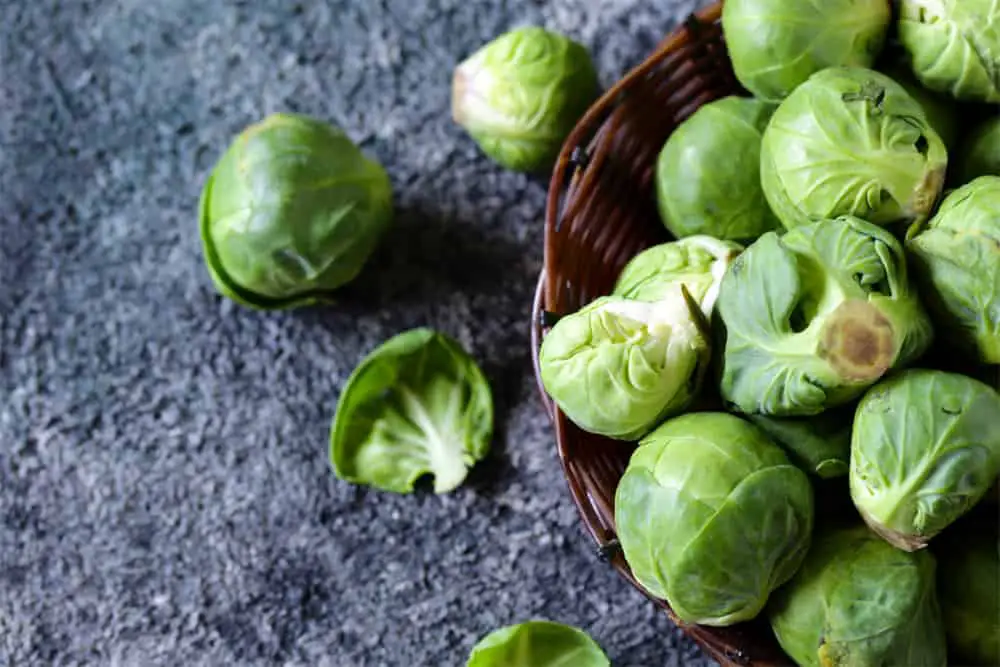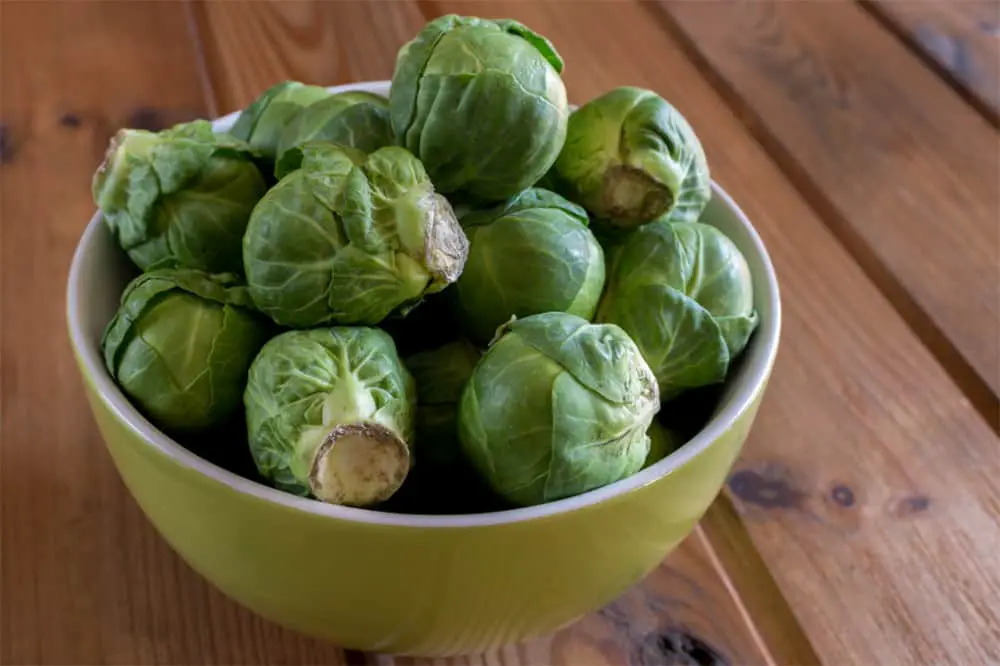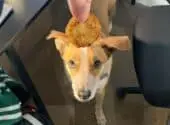We all love Brussels sprouts, don’t we? But have you ever wondered if your dog would love one too?
They’re nutritious, delicious, they can be sauteed, fried, microwaved, roasted, put in a salad, or served up alongside that all-important Christmas dinner. So why wouldn’t you want to share this wonderful vegetable with your dog?

Well, this article answers all the questions about the possibility of feeding your dog some Brussels sprouts next time you find yourself munching away at them.
It’ll tell you what you need to look out for, some of the benefits, and some of the dangers. So what are you waiting for? Let’s dive in!
What Is A Brussels Sprout?
We’ve just dived in and assumed we’re all Brussels sprout experts, but sometimes that’s not the case. We know that there are Brussels sprout amateurs out there and even people who haven’t heard of the vegetable before?
Well, not to fear. Simply put, a Brussels sprout is a round, green, mini cabbage. They’re a member of the Gemmifere Group of cabbages from the plant species of Brassica oleracea and are grown for their edible buds.
They are part of the cruciferous vegetable family as well as being from the mustard family that includes vegetables such as cauliflower, broccoli, cauliflowers, kale, and collards. “Cruciferous” comes from the Latin ‘Cruciferae’, which means “cross-bearing”. This makes perfect sense since Brussels sprouts have four petals that favor across evenly.
They measure around 1.5-4cm in diameter and have been extremely popular in Brussels and Belgium. (Hence the name).
They are usually prepared from a fresh or frozen state and are often a winter vegetable, becoming a festive favorite for dinner parties over the holiday season, yet people still go mad for them in a salad over summer. So what’s not to love?
Are Brussels Sprouts Safe To Feed To Your Dog?
Like humans, dogs can react badly to certain foods. But the main difference is that some foods that are perfectly healthy for humans, maybe deadly to dogs.
Sharing the taste of your favorite dish is never worth risking your dog’s health, so it’s always best to double-check first. If you’re reading this article already it suggests you’re doing exactly that, and we’re so happy you’ve decided to read up on Brussels sprouts before sharing them with your perfect pedigree.
There has been debate over many years about whether Brussels sprouts are safe for dogs to eat and the short answer is yes! But only if they are served the right type and in moderation.
The mini cabbage can actually not only be a tasty treat but beneficial to your dog’s overall health as they are full of healthy vitamins, antioxidants, fiber, and minerals that can lower inflammation.
However, whilst they are safe for most dogs, they can still cause certain gastrointestinal issues such as gas and diarrhea, so ensure you speak to your vet before jumping on the bandwagon to make sure your dog will be ok and not in any discomfort after trying this new human food. But don’t let this put you off.
If you get the all-clear from your vet, we suggest going for it! The benefits will shock you and we’re about to jump into these in a lot more detail, so keep reading!
Can My Puppy Eat Brussels Sprouts?
Before we dive into the benefits, it’s important to note first that although Brussels sprouts can be perfectly safe for dogs to eat, we wouldn’t recommend feeding them to a new puppy unless your vet tells you to for a specific medical purpose.
This is because the first few months of your pup’s life should consist only of special diets approved by your vet during an examination.
Like human babies, puppies have a slightly more delicate digestive system than full-grown dogs and so giving your puppy Brussels sprouts might do more harm than good.
It could easily result in diarrhea and vomiting, as well as a whole other range of side effects that are going to upset your little pup as they’re only just starting in life.
Benefits Of Feeding Your Dog Brussels Sprouts
Nutrient-Dense Foods
Undeniably, Brussels sprouts are some of the most nutrient-dense foods you can find out there. This comes down to the vitamins, minerals, and antioxidants we mentioned earlier in this article.
But what kind of vitamins are actually in the vegetable? First, we have vitamin A. Vitamin A is great for the eyes. It promotes a normal vision for your dog and a healthy nervous system.
It also keeps the heart, lungs, and every other organ in a dog working as they should be. Next, we have vitamin B.
Brussels sprouts contain vitamins B1 and B6, and vitamins in this family support blood circulation and boosts that heart health even further. Both vitamins C and vitamin K can also be found in the green vegetable and these boost your dog’s immune system and overall bone health.
Finally, vitamin E is an antioxidant found in Brussels sprouts that protects cells from the damaging free radicals caused as a result of the dog converting food into energy. Sounds good right?
Well, what about minerals? Brussels sprouts not only include healthy vitamins but also health-boosting minerals such as manganese and potassium. Both these minerals are essential to your dog’s diet.
Manganese aid a dog’s digestion and helps them digest protein and amino acids whereas potassium is essential for the healthy function of dog muscles, enzymes, and nerves.
Potassium additionally ensures your pup maintains a healthy fluid balance in their body. Other health-boosting minerals found in Brussels sprouts are iron, thiamine, and phosphorus.
Let’s not forget about the antioxidants. For those who might be unsure, antioxidants are substances that inhibit oxidation. They are commonly used to counteract the deterioration of stored food products and the one found in Brussels sprouts is kaempferol.
Kaempferol has several different health benefits from lowering inflammation, making Brussels sprouts the perfect anti-inflammatory compound, and preventing any oxidative damage in dogs. Kaempferol also may help reduce cancer cell growth and improve your pup’s heart and bloodstream.
Not only are these vitamins, minerals, and antioxidants running through each mini cabbage but the vegetable is also rich in fiber.
Fiber is essential in your dog’s diet to keep that colon functioning, your dog’s digestion healthy and those bowels moving! Fiber can even help regulate blood sugar levels, meaning it could be the perfect vegetable for your diabetic dog.
Finally, Brussels sprouts are naturally low in calories. This makes them perfect for any dog owner that has been advised their dog needs to shed a few pounds for health reasons, yet they still want a treat to reward their dog on special occasions.
The Darker Side Of Brussels Sprouts
Yes, you read that right. Although Brussels sprouts are bursting with natural goodness, they need to be fed to your dog correctly or you will be crossing over into a dangerous and dark side of the vegetable.
Brussels sprouts are high in fiber and known to have a high number of isothiocyanates. This is a substance that aids the intestinal muscle to get all of that digested food right along the intestinal tracts.
Now you may think this results in excess gas. I can assure you it’s not. It’s the extra bacterium that gets built up that causes extreme flatulence and as a result, extreme discomfort for your pup. Too much fiber can be hypermotile on its own and increase the movement of one’s digestive tract.
This means if your pup eats an excessive amount of Brussels sprouts, especially if they have a sensitive stomach, they may end up not only having that increased flatulence but also experience loose stools, diarrhea, and bloating.
While this isn’t life-threatening, it can certainly make your pup miserable and puts them in great discomfort.
If they experience any of these issues that don’t go away after several days, it’s also a good idea to contact your vet as something could be wrong with your furry friend that needs medical attention. And of course, stop feeding them Brussels sprouts right away!
But it’s not all bad! Many dog owners report that their dog has no issue with the extra fiber in their diet!
Furthermore, if it’s only a mild case of flatulence, it typically goes away on its own after the increased gas has been emptied from their system!
Again, like humans, dogs can also have allergic reactions. Your dog can develop an intolerance or allergy to Brussels sprouts and that’s not uncommon. If you find this is the case, stop feeding your dog the vegetable and contact your vet urgently.
Common symptoms you may notice in a dog that’s allergic to Brussels sprouts are nausea, vomiting, diarrhea, itching or increased grooming, a fever, lethargy, and just general strange behavior, so keep an eye out for these!
How Many Brussels Sprouts Should I Be Feeding My Dog?
This can be important to note, especially as it’s not uncommon for dogs to just keep eating until they are told not to, and this can be dangerous, especially for overweight pups.
Whilst feeding your dog Brussels sprouts, it almost becomes extra important, as too many can cause extreme gastrointestinal issues due to the high fiber content.
But just like any food, moderation is key and small amounts every so often will be perfectly safe for your dog. Smaller dogs however do not need as many Brussels sprouts as larger dogs to have the same effect, whether that be a positive or negative effect. The same goes for how your dog’s bowel movements are.

A dog with loose stools will need far fewer Brussels sprouts than a dog that constipated would need. If you’re still unsure of how many your dog might need, it’s best to consult your veterinarian.
If you’re searching for a number, however, it’s important to note that a serving size for any dog should never exceed three Brussels sprouts and smaller dogs may only be able to digest around a quarter to one whole Brussels sprout at any given time. If your dog is new to the Brussels sprout game, don’t go giving them three to start.
Maybe try a quarter or half of a cooked Brussels sprout and ease them into their new favorite vegetable.
This way, you can also judge if your dog might have any side effects and increase how many they’re eating if you find they don’t react in any way.
If your dog is fine with the vegetable, make sure you keep feeding it only in moderation, however. It’s packed full of nutrients which means just like humans, they only really need a small portion of it.
How Do I Serve Brussels Sprouts To My Dog?
Humans often go for the gourmet option. They like spicing up their Brussels sprouts with oils such as olive oil or coconut oil, spices and herbs, salt and pepper, or even serving them in maple syrup with chestnuts and bacon.
Sounds delicious right? Well don’t worry, your dog won’t care if you haven’t dazzled their Brussels sprout in the same way. All they want and need is a nutritious vegetable! Even if it’s served on its own as a one-off treat! They won’t know any different.
You’ll still need to be an expert on selecting and prepping your dog’s Brussels sprouts, however.
When you’re at the store, at your local farm, or any other place they might sell the famous mini cabbage, keep an eye out for firm, green vegetables. You don’t want to go buying a vegetable that is overly ripe, rotten, or soft.
Then when you return home, ensure you wash them thoroughly, just as you would when preparing vegetables for humans and you would do with any other vegetable on the market.
You may also cut off the stem and then leave the leaves intact. Finally, ensure you cut the sprout in halves or quarters, making it easy enough for your pup to eat.
As far as cooking them goes, yes, your dog could handle small amounts of raw Brussels sprouts if it was cut small enough to prevent choking, yet cooking them first is highly recommended and is how most dogs prefer to eat them.
Feeding your dog too many raw Brussels sprouts can also damage their digestive system so it’s in their best interest you cook them first.
How do I cook them you ask? Luckily, we know a couple of ways of cooking Brussels sprouts that will for sure go down a treat with your furry friend. Steaming your Brussels sprouts is popular for a lot of dog owners as it’s so quick and convenient. To cook them this way, simply pop the Brussels sprouts and water into a 3 to 4-quart pot and cover.
Cook these on relatively high heat for five minutes, or until they are tender to the touch. You can also microwave your Brussels Sprouts. To do this, add the sprouts and water to a 1-½ qt microwavable dish and cover.
Then place in the microwave and leave on high for around six to eight minutes. Ensure to stir every two minutes and check to see if they are tender before serving. Finally, you may choose to boil your Brussels sprouts.
To do this, pop them in a pan with water and gently boil for around fifteen to twenty minutes, or they are tender.
You can even roast them if you are roasting them for yourself anyway, but ensure you serve them to your dog before you add any other seasonings or cooking products.
Whichever way you decide to cook your sprouts, ensure you don’t overcook them however as they will, unfortunately, lose their nutritional value. How you cook them may depend on how much time you have, what resources you have, and how your dog likes them but don’t worry, this is about as complicated as it gets.
We promise they don’t want any added spice or chestnuts too! If you did fancy doing something different with your dog’s sprouts though, try adding them to your everyday dog food for some extra health benefits, as well as bulking out the meal and adding extra flavor.
If you find your dog hates the taste of Brussels sprouts, don’t be afraid to sneak them into their favorite homemade meals or treats, for them to get the beneficial boost in vitamins, minerals, and antioxidants.
Are There Any Vegetables I Can’t Feed My Dog?
So now we’ve established that Brussels sprouts can be a perfectly safe vegetable option for most dogs, you may be wondering if there are vegetables that you should never let your dog eat. If there are vegetables that can be harmful or even deadly? Well, actually there are.
Onions, leeks, garlic, and chives (Allium family)– These vegetables can be toxic. You may find yourself with a dog who has a bad stomach, who is vomiting, who has diarrhea, and it can even cause red blood cells to rupture completely.
Mushrooms– These can be deathly! Especially, if your dog ends up eating wild mushrooms. Although some kinds of mushrooms are perfectly safe, the risk of eating a wild one is not worth eating them at any point during their life. It could only cut it short.
As with a reaction to Brussels sprouts, if your dog consumes anything harmful, make sure you visit your vet or emergency room as soon as possible.
Final Thoughts
If you’ve got to the end of this article, we hope you’re now an expert on both the benefits and dangers of feeding your dog Brussels sprouts.
We believe the nutritional benefits of Brussels sprouts offer a great opportunity for dog owners to increase the overall health of their furry friend and so if given the all-clear from your vet, and you find your dog doesn’t react in any way over the following 24 hours of first trying them on the green vegetable, we say go for it!
But remember, your dog needs a balanced diet. So ensure Brussels sprouts are kept as a treat or healthy addition to their normal meals, instead of replacing every other food they eat with a mini cabbage! This would only do more harm than good.
But on that note, go prepare some Brussels sprouts and enjoy sharing your new favorite vegetable with your best furry friend!




